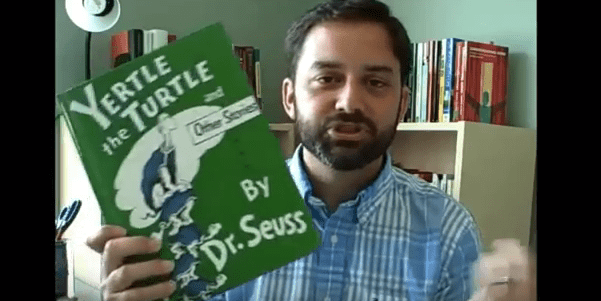
Dr. Seuss’s book Yertle the Turtle is about a King who rules through violence, oppression, and scapegoating. But the more he builds his kingdom on the backs of his subjects, the more likely his kingdom will come tumbling down into the mud. [Video Below]
What does Yertle the Turtle have to do with the Gospel? In his book, Must There Be Scapegoats, Raymund Schwager discusses St. Paul’s statement about that the “Wrath of God” in Romans 1. The “Wrath of God” isn’t something inherent to God. In fact, wrath is a purely human phenomenon. But God’s “wrath” for Paul has nothing to do with violence. Rather,
According to Paul, God’s anger consists only in the deliverance of humankind to themselves, their desires, passions, and perverse thinking. No external violence plays any further role. God’s wrath is identical with the granting of full respect for the human action that turns against God and leads to complete perversion of personal relationships.
We see the “complete perversion of personal relationships” as Yertle builds him empire on oppression, but his kingdom soon falls. The biblical prophets gave the same message to the ancient kings – if continue to scapegoat the poor, weak, and marginalized, your kingdom will fall. The alternative is to care for those who are marginalized.
Jesus picked up that strand within the prophets and showed that the kingdom of God was based not on oppression and scapegoating, but on caring for the marginalized. Schwager states that this is the new order of human relationships. “Whereas the old social order was founded on the scapegoat mechanism, the new people distinguished themselves by the fact that they no longer needed to compete with one another for supremacy.” This new way of life frees us to live into God’s realm of love and compassion for all people, including our scapegoats.
“The uncovering of the underlying process of violence through the message of boundless love must lead inevitably to a fundamental change in power structures,” writes Schwager. Those in power may experience that change in power structure as the “Wrath of God.” But it isn’t wrath. Rather, it’s God’s loving justice that seeks to heal our relationships with “boundless love.”
For more in the Dr. Seuss and the Gospel Series, see:
Part 1: On Beyond Zebra and the Restoration of all Things
Part 2: The Lorax, the Prophets, and the iPad
Part 3: The Cat in the Hat, Jesus, and Chaos
Part 4: How the Grinch Stole Christmas
Stay in the loop! Like Teaching Nonviolent Atonement on Facebook!











